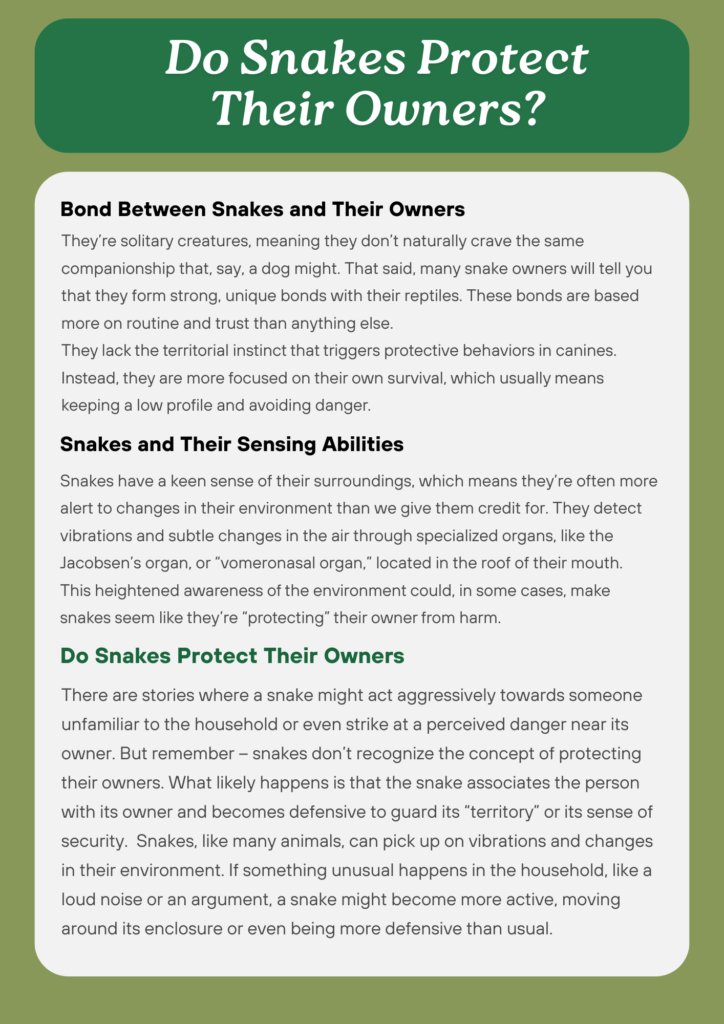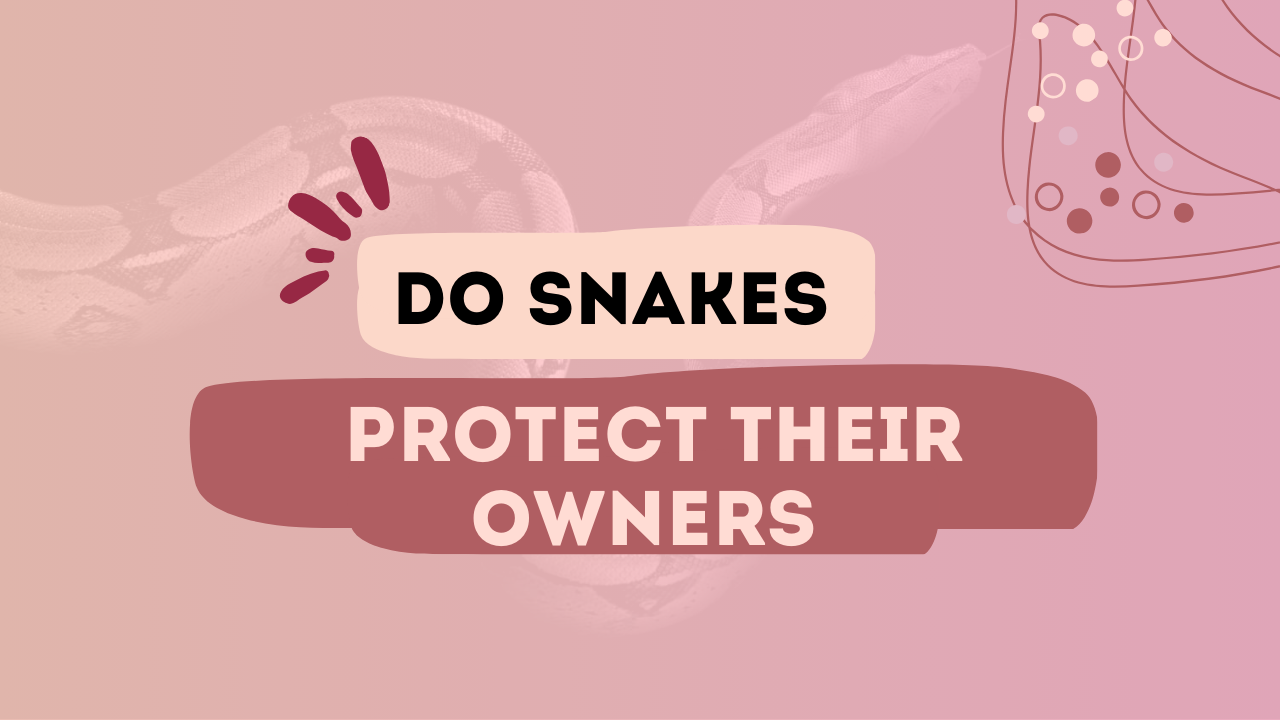When we think of animals protecting their owners, we usually picture loyal dogs or watchful cats. But what about snakes? Do Snakes Protect Their Owners? It may seem like a silly question to some, but for snake enthusiasts and pet owners, it’s one that comes up quite a bit.
Snakes, unlike more conventional pets, don’t exactly have the reputation of being “guardians” or “protectors.” However, there’s a growing interest in the idea that these cold-blooded creatures might be more connected to their human caretakers than we think. So, let’s dive into this intriguing question: Do snakes protect their owners?
The Bond Between Snakes and Their Owners
First things first – the relationship between snakes and their owners is a little…well, different from the one you’d find between humans and their furry pets. While dogs are trained to recognize and react to their owners, snakes don’t have that kind of social behavior. They’re solitary creatures, meaning they don’t naturally crave the same companionship that, say, a dog might. That said, many snake owners will tell you that they form strong, unique bonds with their reptiles. These bonds are based more on routine and trust than anything else.
But does that trust translate into protection? Snakes, after all, don’t have the capacity to “guard” someone in the same way a dog would. They lack the territorial instinct that triggers protective behaviors in canines. Instead, they are more focused on their own survival, which usually means keeping a low profile and avoiding danger. However, some snake owners argue that their pets do indeed show some form of protective behavior, though it’s not what you might expect.

Snakes Are Naturally Defensive, Not Protective
Snakes, by their nature, are defensive creatures. When they feel threatened, their primary instinct is to protect themselves, not to look after their human. A snake will usually react to a perceived threat by either hiding, fleeing, or – in some cases – striking. These behaviors are all about self-preservation. The snake’s body language can show if it feels uncomfortable or threatened, often using defensive postures like hissing, puffing up, or coiling into a defensive position.
However, there are a few situations where a snake might seem like it’s protecting its owner – though, as mentioned earlier, it’s likely more about the snake protecting itself or responding to its environment. For example, some snake owners have reported that their pets become particularly defensive when they sense someone approaching their owner in a way that might be deemed threatening. It’s unclear if this is a form of protection or simply a reaction to changes in the environment.
Do Snakes Protect Their Owners
Now, some owners swear by the idea that their snakes do, in fact, try to “protect” them. There are stories where a snake might act aggressively towards someone unfamiliar to the household or even strike at a perceived danger near its owner. For instance, if a stranger enters the room and the snake is out of its enclosure, it might display defensive behavior toward them. But remember – snakes don’t recognize the concept of protecting their owners. What likely happens is that the snake associates the person with its owner and becomes defensive to guard its “territory” or its sense of security.
Another example some snake owners mention is when their snakes appear to be more alert or responsive when their owner is in distress. Snakes, like many animals, can pick up on vibrations and changes in their environment. If something unusual happens in the household, like a loud noise or an argument, a snake might become more active, moving around its enclosure or even being more defensive than usual. But once again, this is not “protective” behavior in the traditional sense—it’s more of a reactive response to perceived environmental changes.
Snakes and Their Sensing Abilities
Snakes have a keen sense of their surroundings, which means they’re often more alert to changes in their environment than we give them credit for. They detect vibrations and subtle changes in the air through specialized organs, like the Jacobsen’s organ, or “vomeronasal organ,” located in the roof of their mouth. This organ allows snakes to sense chemical signals in the air, helping them detect the presence of prey, predators, or even changes in their immediate surroundings.
This heightened awareness of the environment could, in some cases, make snakes seem like they’re “protecting” their owner from harm. For instance, a snake might detect vibrations from a person approaching or even pick up on a subtle shift in the atmosphere that might indicate danger. The snake’s instinct to act defensively in these situations could be interpreted as a form of protection, but it’s really just the animal’s survival instinct kicking in.
The Importance of Understanding Snake Behavior
If you’re thinking about keeping a snake as a pet, it’s important to understand that they are not like other pets in terms of emotional bonds. Unlike a dog, who will eagerly defend its family, a snake will likely focus on its own safety first and foremost. This is why it’s important to approach your snake with respect and patience. Understanding their body language, routine, and needs will help create a bond built on trust, not on expectations of protection.
Furthermore, if you’re looking for a protective pet, a snake might not be your best bet. Dogs, for example, have been bred for centuries to serve as protectors, guard animals, and companions. Snakes, on the other hand, have evolved to be solitary hunters and survivors, not protectors.
Conclusion: Snakes Aren’t Protectors, But They Can Be Companions
So, do snakes protect their owners? In short, not really. Snakes aren’t equipped with the social instincts that would allow them to offer protection in the way that we might expect from more conventional pets.
However, they do form bonds with their owners, and their behavior can sometimes make them seem more attuned to their surroundings, even reacting in ways that might seem protective. But it’s important to remember that, at the end of the day, a snake’s priority is its own safety and well-being, not guarding its human.
If you’re looking for a pet that will keep you safe from harm, a snake probably isn’t your best choice. But if you’re interested in a unique, low-maintenance companion that can still bring a lot of joy, a snake might just be the perfect pet for you—just don’t expect it to jump in front of danger to protect you!

